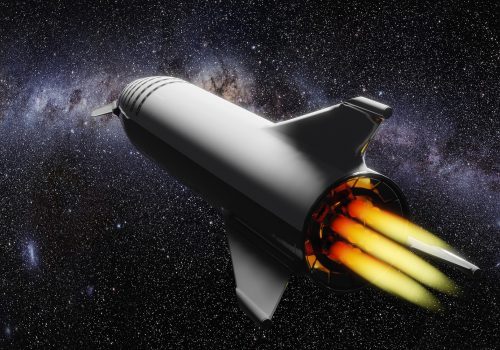FAST THINKING: Mars, with Chinese characteristics
GET UP TO SPEED
It’s a Red Planet traffic jam. This weekend China announced that its rover, Zhurong, had touched down on Mars—a massive step forward for the country’s space aspirations. The US rover program, which recently launched a helicopter over Mars, is considered more advanced. But Zhurong, which boasts an impressive ground-penetrating radar that will search for water, is a sign of China’s growing sophistication in space. What does this mean for the great-power space race? What are the military implications? Our space experts phoned home with the answers.
TODAY’S EXPERT REACTION COURTESY OF
- Julia Siegel: Program assistant with the Scowcroft Center for Strategy and Security’s Forward Defense initiative
- David Bray: Director of the GeoTech Center
The state of planetary play
- Though China trails the United States in space, Julia says, its Mars program shows how Beijing “will continue to challenge US superiority” there. “If China pioneers activity beyond low-Earth orbit” (which Mars falls outside of), she tells us, “the trajectory of US security and prosperity in space comes into question.”
- David notes how space competition is becoming “three-dimensional chess,” with nation-states as well as private companies such as Elon Musk’s SpaceX and Jeff Bezos’s Blue Origin all moving in on interstellar real estate. Since China’s private sector is intertwined with its government, the United States and China are playing two “very different games,” he says. “This is a broader question of whether China’s form of organizing its economy, focus, and resources can propel it to the Moon and Mars faster.”
- The melding of public and private interests also means that this is not the US-USSR competition of the twentieth century. “It’s different from the normal space race and it does raise questions about how space benefits everybody, and is not just for resource exploitation,” David says.
- The United Arab Emirates, David notes, also recently got a probe to Mars, so more nations are headed in that direction. But it’s unlikely humans will land on the Red Planet anytime soon given the hazards. “We could do it, but it’s probably a one-way trip,” he says.
Subscribe to Fast Thinking email alerts
Sign up to receive rapid insight in your inbox from Atlantic Council experts on global events as they unfold.

Military matters
- While China is making peaceful scientific strides in space in areas such as satellite internet, Julia points to the “chaotic debris” that resulted from Beijing’s 2007 anti-satellite missile test as a “more dangerous use of space.” She says “China will only continue to project power in space, using its accomplishments to communicate its leadership on Earth while building capabilities with potential to disrupt US space-based communications and operations.”
- The United States should respond by establishing “acceptable behaviors in the space domain with its allies and partners, expanding relationships like NATO to outer space,” says Julia, the co-author of a recent Scowcroft Center report on the future of security in space.
- The United States’ newly christened Space Force branch of the military, Julia says, “must recognize the tactics China employs in space—including cross-domain warfare, asymmetric warfare, and blurring the lines between peacetime and war—and ensure its own strategy is designed to combat Chinese tactics.”
To infinity and beyond
- China’s next step, according to David, could be to build its own space station where it can study the long-term effects of space on the human body, though Chinese researchers might already have gained some of that knowledge from their space partnership with Russia.
- In terms of future Mars exploration, David says the United States could join with allies such as Japan and Australia to replicate the Artemis Accords for the Moon. “I’d love to see if we can do an equivalent Martian Accords, so it’s not just the US planting a flag on Mars in the future but all nations beneath the banner of open societies.”
Further reading
Sun, Apr 11, 2021
The future of security in space: A thirty-year US strategy
Atlantic Council Strategy Paper Series By
Outer space is rapidly transforming as new actors test new limits. This Atlantic Council Strategy Paper calls for the United States and its allies and partners to secure space over the next three decades or risk wasting the promise of this emerging domain.
Thu, Feb 4, 2021
Protecting the new frontier: Seven perspectives on aerospace cybersecurity
Article By Simon Handler
The aviation community is experiencing unprecedented difficulties, while space is emerging as a new fronter with challenges of its own. But there are opportunities for experts across the aerospace sector to tackle its cybersecurity challenges.
Thu, Apr 15, 2021
FAST THINKING: What the Russia-China moon deal means for the commercialization of space
Fast Thinking By
On this episode of Fast Thinking, Atlantic Council experts Divya Chander and David Bray explore what this announcement will mean for geopolitics and the commercialization of space—touching on space mining, the Artemis Accords, the Outer Space Treaty, and what we can learn from native cultures about the rights of our planet and others.
Image: The planet Mars is shown in this NASA Hubble Space Telescope view taken May 12, 2016 when it was 50 million miles from Earth. NASA/Handout via Reuters.

